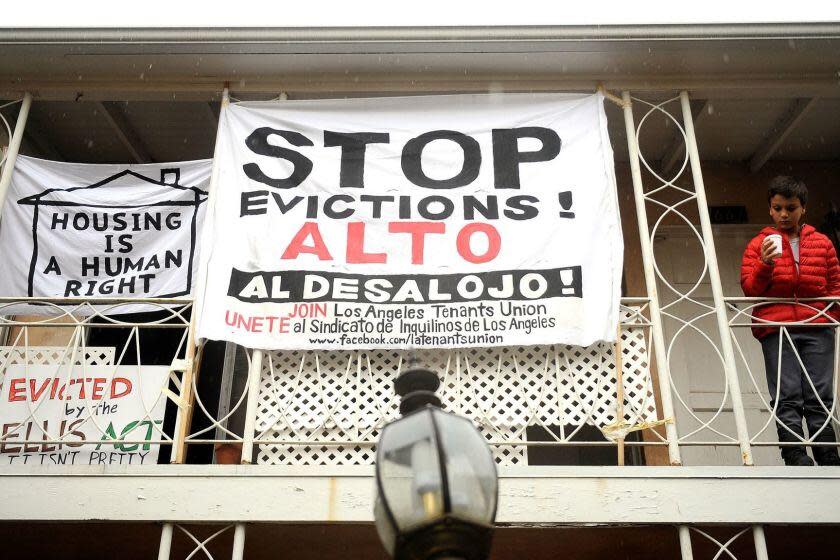Are you a renter in California? Here's what to know about tenant protections lawmakers are considering

- Oops!Something went wrong.Please try again later.
Amid a housing shortage that's pushed low-income renters onto the streets and made it difficult for moderate earners to find affordable options, California lawmakers introduced new measures this year to mitigate high costs of living and prevent evictions.
Read more: What are California lawmakers doing to fix the housing crisis? A look at 2023's new bills
Here are two bills to help renters that cleared a major hurdle and one proposal that flopped this week as the Legislature took action before a key deadline on Friday:
Passed: Limiting security deposits
The Assembly easily approved a bill to ban landlords from charging more than one month's rent as a security deposit.
Assemblymember Matt Haney, a San Francisco Democrat who authored Assembly Bill 12, said that surging rent has made it increasingly difficult for renters to pay security deposits, which can equal up to three months worth of rent, or more than $10,000 in some cities.
Read more: Newsom says the state is on track to cut unsheltered homelessness by 15%
"This means a security deposit can be as much as a down payment on a house in many parts of the country," Haney said before the Assembly approved the measure. "This pushes many families, including those with individuals making minimum wage, to either forgo necessities such as food and utilities or acquire more debt in order to be approved for housing."
Groups representing landlords opposed the measure, arguing that the lack of affordable housing units, not security deposits, is the real issue facing California renters, and that AB 12 would harm homeowners.
"Charging security deposits allows for rental property providers to balance risk associated with renting out property," the California Rental Housing Assn. wrote in a bill analysis. "Without the ability to collect enough in security deposit to cover potential damages, rental property providers may decide to remove their homes from the rental market — further exacerbating the housing supply crisis."
The bill will now be considered by the Senate, which has until Sept. 14 to vote on it.
Read more: L.A. County's eviction moratorium has expired. What does that mean for renters?
Passed: Curbing evictions
In 2019, the Legislature hashed out a deal with landlords and realtors on a bill to establish new rules against evictions and cap yearly rent increases to 5% plus inflation.
But state Sen. María Elena Durazo (D-Los Angeles) said those protections didn't go far enough. Durazo introduced Senate Bill 567 this year to lower the rent cap to inflation, not to exceed 5% annually, and strengthen oversight of allowable evictions to ensure landlords aren't exploiting what she described as loopholes in the law.
Facing pressure from business groups, apartment associations and moderate Democrats, Durazo later removed the rent cap provision of the bill. But advocates pushed hard to keep in accountability measures that would ensure landlords are not using evictions to remove a lower-paying tenant to later jack up the rent.
"We are all feeling the impact of the homeless crisis in our districts," Durazo said during a Wednesday debate over the bill. "Part of what we have to do is stop the flow of families and people into homelessness."
Read more: California tenants will see cap on rent increases under bill sent to Newsom
The changes Durazo made to the bill did little to appease the opposition. Republicans and a handful of Democrats opposed the measure as unfair and costly to homeowners.
"This bill will affect small rental property owners the most," said Senate Republican Leader Brian Jones of Santee. "This bill goes a little bit too far."
The measure narrowly passed the Senate and now heads to the Assembly.
Failed: Rent control expansion
Lawmakers this week killed one proposal to give tenants more protections through a measure to expand rent control.
State Sen. Aisha Wahab (D-Hayward) introduced Senate Bill 466 to update a 1995 law that limited rent control in California and allow for some newer buildings to become eligible for the price capping.
"We allow landlords to raise rents with impunity while taxpayers foot the bill for a problem that could be mitigated if jurisdictions were allowed to enact common-sense rent regulation policies," Wahab said during a Wednesday Senate floor debate, while holding up a sleeping bag as a prop to make a point about the worsening homelessness crisis.
California voters have rejected an expansion of rent control twice in recent elections. Landlord groups, including the California Apartment Assn., contend that rent control stymies construction and discourages homeowners from putting new units on the market.
Read more: Why liberal California keeps saying no to rent control
That argument prevailed in the Senate on Wednesday, when SB 466 failed by a large margin as several Democrats either withheld their votes or joined Republicans in opposing the bill.
It's unusual for Democrats, who control the Legislature, to bring bills to the floor knowing they will fail because it exposes divisions among the ruling party. Wahab said she anticipated her bill would fall short, but that it was important to see who would go on the record in support.
"I think it's important for advocates and activists to understand who will go up on a tough issue and who really cares about affordable housing," Wahab said. "I thought it really mattered."
Sign up for Essential California, your daily guide to news, views and life in the Golden State.
This story originally appeared in Los Angeles Times.

